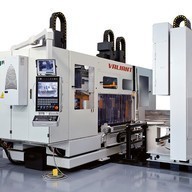-
Over 90 Years
industry expertise
-
Largest
facility & product range
-
Leaders
in the technology market
-
UK Based
service department
Four benefits of implementing automation into structural steel manufacturing
As the steel industry transitions into Industry 4.0, fabricators of all sizes should look towards automation technologies to keep up with technology improvements. Automation is becoming a feature in many aspects of our lives and, in structural steel manufacturing, it has the potential to improve every stage of the production process, supporting growth and an improved bottom line.
1. Eliminating human error for premium quality steel products
There is no denying the high level of skill and labour required to manufacture structural steel but sometimes there is room for human error and misjudgment. By taking away scope for human error by automating these jobs, it makes it possible to reproduce high quality, products again and again.
Take our Valiant; our latest three spindle CNC drilling line as an example. This offers countersinking, drilling, marking, milling, sawing, scribing and tapping in one machine. Tasks which would have otherwise been done by multiple machines, requiring more operators, more processing time and negatively impacting productivity.
2. Optimising material usage for overall production efficiency
When we talk about automation technologies improving overall production performance, we don’t just mean creating higher quality products, faster than traditional manual processes. We mean the overall efficiency of the production process is improved, including optimising material usage and reducing the volume of waste, a common and costly challenge that steel fabricators try to overcome. And, not forgetting the environmental benefits of improved production efficiency - by maximising resources it reduces the emissions generated.
At a time when steel producers are focusing on streamlining production and improving efficiencies, lean manufacturing - the process in which waste is reduced without compromising on quality - is one of the ways structural steel manufacturers can help recover post Covid 19.
3. Accelerate production processes
Machines work notoriously quicker than humans - producing more goods in the same amount of time. By investing in a machine that automates many of the processes an engineer would traditionally be responsible for, it improves work efficiencies and productivity, providing operators with more time to focus on other tasks.
There are also benefits for the customer. Improving the tonnage of the products and the productivity of manufacturing the steel means that more products can be produced quicker, with shorter delivery times, creating a faster turnaround for customers.
____________________________________________________________________________________________
Our Costa MD 4 plate helped FLI Structures dramatically increase productivity levels, with the machine saving the company employing 1.5 people in labour per week for that specific role.
By implementing automation into steel manufacturing machines, it can improve productivity levels by up to 40%.
4. Enhance employee safety
Working on factory floors with structural steel manufacturing equipment poses inevitable risks such as:
● Handling heavy equipment
● Using sharp edged items
● Working with electrical equipment
● Working from height
● Using loud equipment
Eliminating the need for engineers to manually complete certain fabrication tasks, an automated production process of structural steel will improve safety by reducing the times needed on the factory floor, around tools, equipment and machines. For example, for FLI structures, reducing the likelihood of hand-arm vibration syndrome was a key factor in choosing to purchase a machine through Ficep.
It’s likely that as automation improves and the structural steel sector continues to adopt Industry 4.0 principles, we will start to see additional benefits filter through. Head over to our Automated Steel Processing and Factory Automation page to find out how our Ficep technology can kick-start your structural steel automation journey.

The Ficep Valiant CNC drilling line